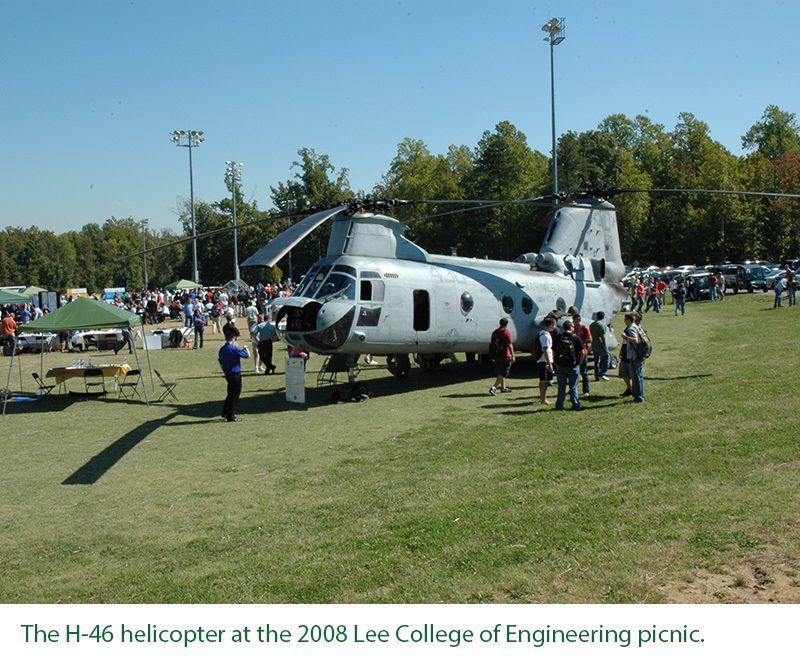Lee College of Engineering’s Long Relationship with Fleet Readiness Center East
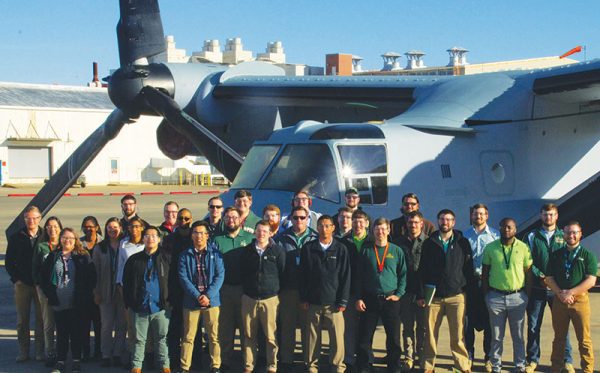
Providing full life-cycle support for Navy and Marine Corps aircraft, systems and weapons, the Naval Air Systems Command (NAVAIR) has a huge demand for civilian and military engineers at multiple locations. To meet this demand, Fleet Readiness Center East at Marine Corps Air Station at Cherry Point, North Carolina, has had a long relationship with UNC Charlotte. Since the 1980s, FRC East has employed more than 90 Lee College of Engineering alumni, sponsored multiple Senior Design Program projects, provided student internships, been active on advisory boards, and participated in the annual College Picnic, including an infamous H-46 helicopter visit in 2008 that sent tables and exhibits flying.
By the numbers, FRC East’s involvement with the Lee College of Engineering includes:
- 94 engineering alumni currently employed
- 30 hired between 1987-2013
- 64 hired between 2014-2018, including 36 in 2018
- Degrees
- ME – 51
- EE – 31
- CE – 6
- 10 Senior Design projects sponsored starting in 2015
- Numerous summer interns since 2014, including 13 in 2019
Some of the personal involvement by NAVAIR team members with the college includes:
- Lance Tucker, Power and Propulsion Engineering Department Head at FRC East, became a member of the UNC Charlotte Mechanical Engineering Advisory Board in 2014. He worked with Dr. Peter Tkacik on winning a STEM education grant from the Office of Naval Research titled “Engaging Military Veterans to Increase STEM Enrollment and Degrees Awarded.” As part of the grant, NAVAIR helped establish the “Developing Military Technology” course and provided one of the first presenters to lecture during the class. Lance also participated on a Q-and-A panel for the 2017 UNC Charlotte Women in Manufacturing event
- Felix Torres, Program Manager of the Entry-Level Engineering Development Program at FRC East, and Angela Bell, Drive Systems In-Service Engineering Branch Head, have collaborated with the college as industry board members since 2017 to help establish Engage ME, a multicultural engineering engagement program. They assisted with program initiatives to engage engineering students from different cultural backgrounds.
Two of the UNC Charlotte engineering alumni at FRC East are Amie Sparnell and Brandon Cayton. Below are their personal observations about working at the air station.
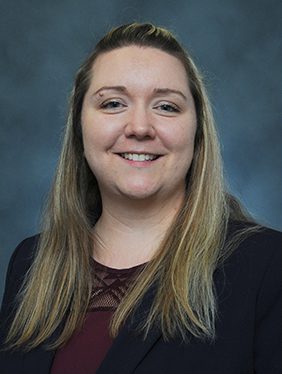
Amie Sparnell has both Bachelor and Master of Science degrees in mechanical engineering from UNC Charlotte. She started working at FRC East in 2010.
“I am currently supporting dual roles,” she said. “One role is V-22 Senior Rotor Systems Engineer, which is part of the V-22 Fleet Support Team (FST). The second role is Patrol and Rotary Wing Aircraft Strength Branch Head for V-22 Structures Offsite and MQ-8 Structures teams. Prior to these roles, I also served as MQ-8 Fire Scout Senior Rotor Systems Engineer.”
“As V-22 Senior Rotor Systems Engineer, I serve as the technical authority and primary contact for all in-service engineering support matters related to the V-22 Rotor System. This includes leading a team of engineers to provide safety, reliability, modification and maintenance support of rotor components to fleet maintainers and repair depots, which perform more complex and time-consuming tasks. Rotor system engineers must understand criticality of components, fatigue life, fatigue testing methods, repair design and analysis, as well as other engineering concepts in order to provide quality products to the customer.”
“As V-22 Offsite and MQ-8 Structures Branch Head, I manage a team of engineers in a leadership capacity by coordinating administrative and organizational issues with local and national leadership. I help ensure customers supported across the branch receive quality technical products in a timely manner, developed with appropriate technical rigor. I direct engineering resources, processes and facilities necessary to support associated FSTs and Integrated Product Teams (IPTs). Senior engineers are those who are experts of their systems. In this role, I am not a subject matter expert, but serve as technical oversight to ensure the team has the resources necessary to provide the customer with quality products needed to complete their mission.”
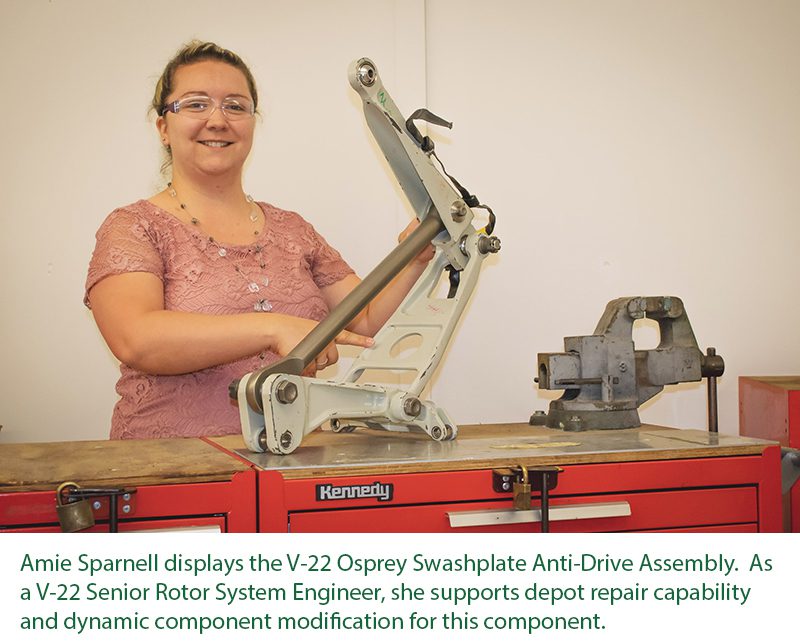
“In my opinion, one of the best aspects of having an education from UNCC is the hands-on experience. As a junior engineer, I was able to communicate with maintainers beyond the capability of my peers by having used a torque wrench and having worked in a machine shop during my time at UNCC. Of course, the breadth of exposure to communication and working in a team environment through labs, design teams and presentations were also key experiences that helped me build skills that have made me successful in my career.
“I work with a fair number of other engineers who graduated from UNCC, including many that I knew as a student. There is a wide experience range here at MCAS Cherry Point; some who graduated prior to the construction of the Duke building and some who graduated just within the past few years. I meet casually with other alumni in the area and there are work-related alumni events, such as UNCC alumni pictures.
“I am constantly challenged in each of my positions which is a primary reason why I have remained with FRC East through most of my professional career. There is always something new to learn, even when serving in a position for more than a couple of years. For example, new failure modes or environmental damage on components that are starting to age with an airframe no longer in production. As aircraft age, they present new issues requiring novel approaches to creating long-term and/or short-term solutions in order to maintain fleet readiness.”
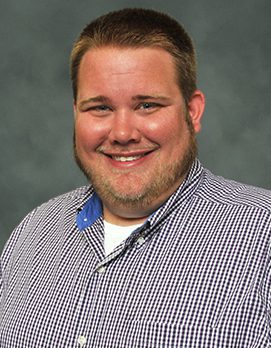
Brandon Cayton graduated with his bachelor’s in electrical engineering from UNC Charlotte in 2014. He has been with FRC East a total of nine years, four years as an intern/co-op student, and five years as a full-time employee. His current job title is Core Test Program Set (TPS) Engineer for the AV-8B Harrier Fleet Support Team, Automatic Test Equipment / Test Program Set sub-team.
“As the core test program set engineer, I am responsible for ensuring the technical accuracy of all the products produced by the sub-team and acting as the technical conscience for the sub-team lead systems engineer,” Cayton said. “Our sub team is responsible for maintaining and updating all of the AV-8B TPSs that operate on the Navy’s Consolidated Automated Support System Family of Testers (CASS FoT). The CASS FoT provides intermediate, depot and factory-level support, both ashore and afloat, for testing all Navy electronics, from aircraft to ships and submarines.
“Duties performed by our sub team include updating TPSs when the avionics systems in the aircraft are updated such that testing constantly reflects real-world scenarios and capabilities. We also provide technical assistance/troubleshooting to deployed Marines and Sailors utilizing our TPSs, and ensuring adequate supply support and repair capability for the TPSs themselves, so that the TPSs last the lifetime of the avionics.
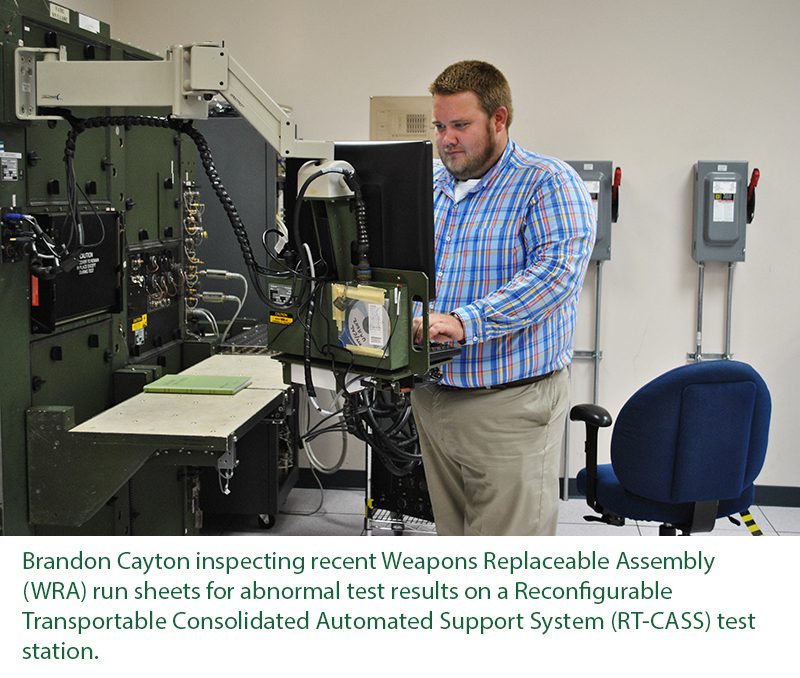
“Our team utilizes several different types of engineers to complete our tasks. Both electrical and computer engineers perform circuit analysis of the avionics systems to design the cables and other electrical hardware needed to interface the avionics with the test station. The electrical and computer engineers also convert the testing requirements to compiled source code to perform the required testing of the avionics assemblies. Mechanical engineers design the holding fixtures and other support hardware needed to contain the interfacing electronics and secure the avionics to the test station for shipboard use. We are led by a systems engineer who keeps track of project timelines, budgets and all required documentation needed during projects.
“From my experience at UNC Charlotte, Senior Design really helped prepare me for the real world. The types of problems, time constraints and documentation you have to go through is a very good representation of the real-world environment. The labs throughout my degree also helped in boosting my troubleshooting skills. I also participated in the COE Leadership Academy, and the communication and interpersonal skills I learned in that program have helped excel me in my career, as communication and teamwork account for 80 percent of what we do.
“We currently have 94 UNCC alumni working here. We have alumni events hosted constantly by our Professional Development Council that aim to connect and network UNCC alumni with each other and the various other alumni from other schools here. Events include groups traveling back to Charlotte for football games, local beach and boat days, watch parties for sporting events, concert groups and local trivia night groups. We also gather once a year for an alumni photo in front of one of the many aircraft we support. The goal is to eventually outnumber the NC State Grads!”
“You cannot beat the work we do at FRC East for NAVAIR. We generate combat air power for America’s Marines and Naval forces daily, working alongside and supporting the warfighter and their mission. The collective group I am a part of is referred to as the In-Service Support Center (ISSC), because all of the products we support are actively deployed with Marines and Sailors. This means that every day we face new challenges as we provide technical and logistical support for those products. You never see the same problem twice and never know what the next phone call or email will bring.”
